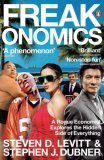Summary | Excerpt | Reading Guide | Reviews | Readalikes | Genres & Themes | Author Bio
A Rogue Economist Explores the Hidden Side of Everything

Critics' Opinion:
Readers' Opinion:
First Published:
Apr 2005, 256 pages
Paperback:
Apr 2006, 256 pages
There's one way to find out: measure the difference between the sales
data for houses that belong to real-estate agents themselves and the houses
they sold on behalf of clients. Using the data from the sales of those
100,000 Chicago homes, and controlling for any number of variables --
location, age and quality of the house, aesthetics, and so on -- it turns
out that a real-estate agent keeps her own home on the market an average of
ten days longer and sells it for an extra 3-plus percent, or $10,000 on a
$300,000 house. When she sells her own house, an agent holds out for the
best offer; when she sells yours, she pushes you to take the first decent
offer that comes along. Like a stockbroker churning commissions, she wants
to make deals and make them fast. Why not? Her share of a better offer --
$150 -- is too puny an incentive to encourage her to do otherwise.
Of all the truisms about politics, one is held to be truer than the rest:
money buys elections. Arnold Schwarzenegger, Michael Bloomberg, Jon Corzine
-- these are but a few recent, dramatic examples of the truism at work.
(Disregard for a moment the contrary examples of Howard Dean, Steve Forbes,
Michael Huffington, and especially Thomas Golisano, who over the course of
three gubernatorial elections in New York spent $93 million of his own money
and won 4 percent, 8 percent, and 14 percent, respectively, of the vote.)
Most people would agree that money has an undue influence on elections and
that far too much money is spent on political campaigns.
Indeed, election data show it is true that the candidate who spends more
money in a campaign usually wins. But is money the cause of the
victory?
It might seem logical to think so, much as it might have seemed logical
that a booming economy in the 1990s helped reduce crime. But just because
two things are correlated does not mean that one causes the other. A
correlation simply means that a relationship exists between two factors --
let's call them X and Y -- but it tells you nothing about the direction of
that relationship. It's possible that X causes Y; it's also possible that Y
causes X and it may be that X and Y are both being caused by some other
factor, Z.
Consider this scenario: cities with a lot of murders also tend to have a
lot of police officers. Let's now look at the police/murder correlation in a
pair of real cities. Denver and Washington, D.C., have about the same
population -- but Washington has nearly three times as many police as
Denver, and it also has eight times the number of murders. Unless you have
more information, however, it's hard to say what's causing what. Someone who
didn't know better might contemplate these figures and conclude that it is
all those extra police in Washington who are causing the extra murders. Such
wayward thinking, which has a long history, generally provokes a wayward
response. Consider the folktale of the czar who learned that the most
disease-ridden province in his empire was also the province with the most
doctors. His solution? He promptly ordered all the doctors shot dead.
Now, returning to the issue of campaign spending: in order to figure out
the relationship between money and elections, it helps to consider the
incentives at play in campaign finance. Let's say you are the kind of person
who might contribute $1,000 to a candidate. Chances are you'll give the
money in one of two situations: a close race, in which you think the money
will influence the outcome; or a campaign in which one candidate is a sure
winner and you would like to bask in reflected glory or receive some future
in kind consideration. The one candidate you won't contribute to is a sure
loser. (Just ask any presidential hopeful who bombs in Iowa and New
Hampshire.) So front-runners and incumbents raise a lot more money than long
shots. And what about spending that money? Incumbents and frontrunners
obviously have more cash, but they only spend a lot of it when they stand a
legitimate chance of losing; otherwise, why dip into a war chest that might
be more useful later on, when a more formidable opponent appears?
The foregoing is excerpted from Freakonomics by Steven D. Levitt and Stephen J. Dubner. All rights reserved. No part of this book may be used or reproduced without written permission from HarperCollins Publishers, 10 East 53rd Street, New York, NY 10022





The Funeral Cryer by Wenyan Lu
Debut novelist Wenyan Lu brings us this witty yet profound story about one woman's midlife reawakening in contemporary rural China.
Your guide toexceptional books
BookBrowse seeks out and recommends the best in contemporary fiction and nonfiction—books that not only engage and entertain but also deepen our understanding of ourselves and the world around us.